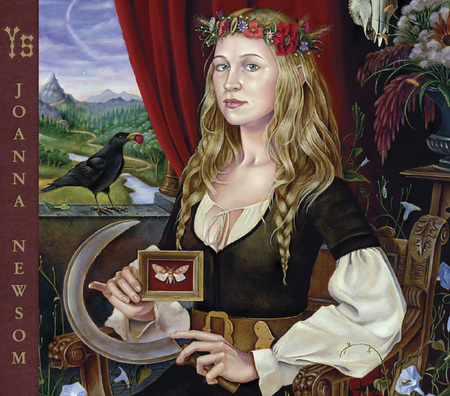The connection between music and books is strong and deep. Paul Bowles was a composer. Nicholson Baker was (is?) a musician. The last page of Jeff VanderMeer’s Shriek has a music acknowledgments page detailing what he was listening to while he wrote the book. This paragraph could go on and on, and it’s easy to see why: in some sense, musicians and writers are after the same thing in the effect they hope to have on their audience.
Yet music has a leg up on words in the way that it can hit us so directly. Using words alone, it’s really hard to bottle the kind of lightning that countless three–minutes-of-heaven-type songs have bottled. But some music provides much the same kind of pleasure as reading a great book; it’s capable of transfixing listeners for a long time, taking them somewhere and bringing them back again, and changing them in the process. One such album is Joanna Newsom’s Ys, which, having listened to it at least a hundred times, I’ve started to think of as the best fantasy novel I’ve ever heard.
To be fair, Ys is about as literate as music gets. Its lyric booklet runs to twenty-seven pages of dense, hyperarticulate verse that swings headlong between beauty and violence. Like this:
Then the slow lip of fire moves across the prairie with precision / while, somewhere, with your pliers and glue, you make your first incision. / And in a moment of almost unbearable vision, doubled over with the hunger of lions, / Hold me close, cooed the dove, who was stuffed now with sawdust and diamonds.
But it’s the music itself that makes the fantasy complete. Newsom sings in an ethereal rasp that has to be heard to be believed1 and accompanies herself on the pedal harp.2 She’s also backed up by a full orchestra3 and augmented with an assortment of other folk instruments from various cultures. The sound is impossible to describe—I really hadn’t heard anything quite like it before and haven’t since4—but its vision is the same kind of vision you hope for from the best fantasy novels, utterly otherworldly and entrancing. Yet it resonates deeply with the world we live in, too; Ys is an album you might give to a skeptical listener in the same way that you might give, say, a Neil Gaiman book to someone who claims not to like fantasy.
It’s hard for me to think clearly about Ys, however, because I love it so much. The effect was so immediate—I was enthralled from the first phrase—that I doubted what I was feeling and looked for people to point out some fatal flaw in it. I haven’t been able to. Instead, I have only enthralled others. The last time was on a long car trip last summer with an old friend. We listened to album after album, chatting through all of them. Then I said, “Hey, you should hear this,” and put it on. Both of us stopped talking until the first pause in the music. I didn’t say anything.
“This is beautiful,” he said. Without a trace of irony.
1
Her voice has changed somewhat since she recorded Ys. A result of touring? Possibly voice lessons? It’s hard to say without asking her directly.
2
That’s the big one—the one with forty-six or forty-seven strings.
3
Arranged and conducted by none other than Van Dyke Parks.
4
In interviews, she lists among the music she likes Americana, modern classical, West African music, and Fleetwood Mac. All of these influences can be heard on Ys, yet—delightfully—they don’t even remotely help you figure out how the hell she came up with that stuff.










